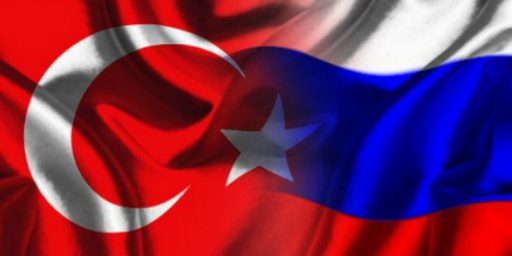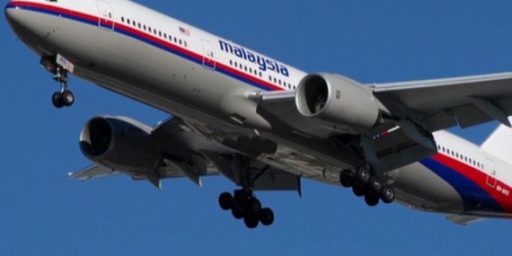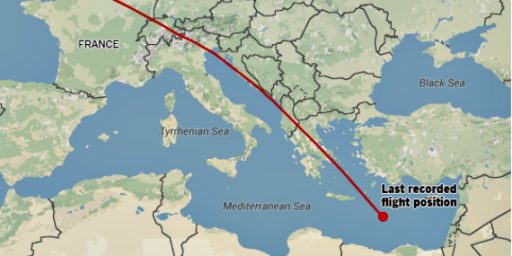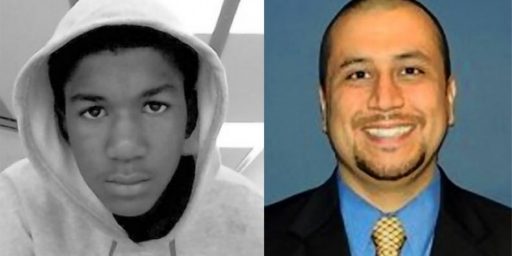White House Pilot Thought Jets Would Shoot Him Down
Hayden L. “Jim” Sheaffer, whose violation of White House air space on May 11 caused the evacuation of the capitol, told NBC’s “Today” show that he feared he would be shot down during the incident but that he did not believe he should lose his pilot’s license.
Pilot Thought Jets Would Shoot Him Down (AP)
The pilot of a plane that was intercepted by the military earlier this month said Tuesday he thought he was going to get “shot out of the sky.” “There was no doubt in my mind,” said Hayden L. “Jim” Sheaffer, who also revealed that he was handcuffed and interrogated by federal authorities when he subsequently landed his single-engine Cessna aircraft May 11 in nearby Frederick, Md. Appearing on NBC’s “Today” show with his lawyer, Sheaffer, who has had his pilot’s license suspended, held his thumb and index finger about an inch apart to dramatize how close he thought he was to being shot down.
Sheaffer’s interview came the day after another such incident, this time involving a plane that violated the restricted air space of the capital city, forcing the Senate to briefly recess. The incident involving Sheaffer had led to the scrambling of military aircraft and the panicked evacuation of thousands of people.
Meanwhile, an internal Homeland Security Department document obtained by The Associated Press is considering whether it should seek authority for its pilots to shoot down errant planes around the nation’s capital. Putting the Coast Guard on air patrol duty in the Washington area, however, could raise questions about whether Homeland Security or the Pentagon would give an order to use lethal force in an emergency. Sheaffer’s passenger, 36-year-old Troy Martin, who had logged only 30 hours of flight time, was flying the plane when the military aircraft intercepted it, the FAA said. According to the Federal Aviation Administration, the 69-year-old Sheaffer wasn’t supposed to have a passenger. It said that he had not met the requirement to do so: three takeoffs and three landings within the previous 90 days of the flight. He didn’t take the most basic steps required of pilots before flying a plane, the FAA said. He failed to check the weather report before leaving Smoketown, Pa., it said, and he didn’t check the FAA’s “Notices to Airmen,” which informs pilots of airspace restrictions and how to respond to a military aircraft.
Despite this, he feels he should not lose his license:
Errant Pilot to Appeal Revocation of License (WaPo)
The Pennsylvania man who flew his Cessna into Washington’s restricted airspace on May 11 called the experience “very scary” in his first interview today but said he tried to follow proper procedures and would appeal the revocation of his pilot’s license.
Hayden L. “Jim” Sheaffer of Lititz, Pa., in an interview on NBC’s “Today” program, said he was aware that the air space was restricted. He realized he was off course over Baltimore and he tried unsuccessfully to communicate with authorities as soon as he spotted a Black Hawk helicopter that was trying to warn him.[…]
The Federal Aviation Administration yesterday revoked Sheaffer’s license but did not take any action against the other occupant of the aircraft, student pilot Troy D. Martin, who was at the controls at times during the flight. The agency said Sheaffer would lose his license immediately and must wait at least a year to apply for a new one and start over with flight school lessons. Because Sheaffer was the only licensed pilot in the aircraft, he is responsible for the plane and the airspace violation, the agency said.
Sheaffer told the Today show that if he had it to do over again, he would have taken control of the plane over Baltimore. “I was aware that they [restrictions] were in place” around Washington, Sheaffer said. “When I first saw the helicopter I knew were were someplace we weren’t supposed to be.” The Black Hawk, operated by immigration officials, held up a sign telling the Cessna to turn to an emergency radio frequency. Sheaffer said he complied but could still not communicate. “We tuned to that frequency,” he said “but we could not communicate with them. The radio worked from the time that we left” Pennsylvania, he said.
Amazing. Mistakes happen, to be sure, but this guy doesn’t need to be flying, let alone serving as an Instructor Pilot. And over the White House, no less?






What we have here is people who’s unclear on the concept of flight privilage. With a screw up this big, I’m surprised he isn’t in jail already.
I am thinking this guy didn’t need to be flying, screw up over DC or no screw up.
Yes. One can’t help but wonder if he needs a psych eval for his licence. I would hope he would disqualify on those grounds.
And after a screw-up that big, he gets to reapply in a year? My local library is tougher with their card regulations.
I took a look at this incident and don’t understand how it could have happened unless one adds “gross stupidity” into the mix. Grossly stupid don’t belong in aircraft. If “stupid” is not the reason then it had to be an intentional act, despite the pilots comments. The FAA needs to keep this guy on the ground.
See my quickie analysis:
http://rofasix.blogspot.com/2005/05/cessna-attack-on-dc-was-intentional.html